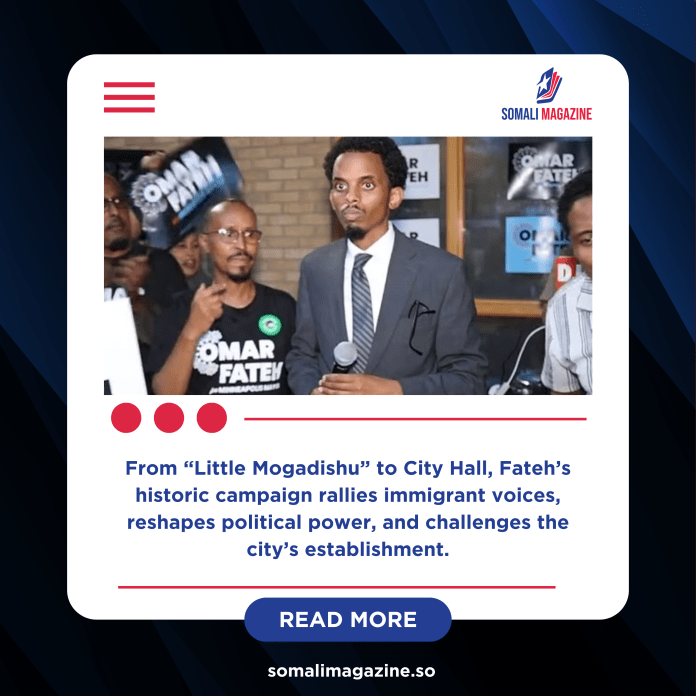Facebook Twitter (X) Instagram Somali Magazine - People's Magazine
Hundreds of people filled the Brian Coyle Center in Minneapolis’s Cedar-Riverside neighborhood—widely known as “Little Mogadishu”—on Sunday night to support Omar Fateh, the first Somali American elected to the Minnesota State Senate and now the leading candidate in the city’s mayoral race.
What once seemed like a long-shot campaign has quickly gained momentum. Fateh’s run for mayor became serious after he won the Democratic-Farmer-Labor (DFL) Party’s official endorsement in late July. His rise has shaken up the city’s political scene, challenging the party establishment and energizing a grassroots movement strongly backed by Somali Americans and other first-generation immigrant communities.
The rally on Sunday was both a celebration and a show of unity. Supporters wore t-shirts printed with Fateh’s name, waved signs that connected local struggles to global ones—like solidarity with Gaza—and spoke proudly in both Somali and English. The mix of languages reflected a community deeply rooted in its culture but also firmly shaping the political future of Minneapolis.
“This campaign belongs to all of us,” Fateh told the cheering crowd, repeating the phrase in Somali to connect more personally with his community.
At 35, Fateh represents a new chapter in the city’s politics. Born to Somali parents and raised in the U.S., he has long balanced life between two worlds: honoring the traditions of his heritage while fighting for justice in his home country. In 2020, he made history as the first Somali and Muslim elected to Minnesota’s State Senate. Now, he is aiming for another first—becoming the first Somali mayor of a major American city.
Fateh’s platform blends economic justice, police reform, and immigrant protections. His proposals include raising the minimum wage to $20, stabilizing rent prices, and ending cooperation between local police and federal immigration enforcement. These issues strike a deep chord among immigrant families, many of whom live with housing insecurity, economic challenges, and fears of deportation.
Observers often compare Fateh to Zohran Mamdani, a Ugandan-Indian politician in New York credited with mobilizing immigrant communities behind progressive causes. Fateh openly calls Mamdani a friend and ally, and both share a vision of grassroots politics led by diverse working-class communities.
But Fateh’s rise hasn’t come without conflict. His success has rattled supporters of incumbent Mayor Jacob Frey, who is contesting the DFL’s endorsement process. A mistake at the July 21 convention left out 176 delegate votes in the first ballot, which critics say changed the outcome. After that, Frey’s delegates walked out before a final vote, leaving Fateh with the endorsement.
The party’s rules committee is now reviewing whether the endorsement will stand. If overturned, it could split the DFL and risk alienating younger, more diverse voters who have rallied around Fateh. More than 200 delegates backing him have already warned party leaders against sidelining the very voters who, in their words, “deliver statewide wins.”
For Somali Americans, this fight isn’t just about party rules—it’s about belonging and recognition. For decades, the community has worked to build its life in Minneapolis while facing barriers of race, inequality, and policing. Fateh’s candidacy gives them a chance to show they are not just part of the city’s population but also a force in shaping its future.
His message is simple: inclusion does not mean assimilation, and political power should be built, not inherited.
Whether this vision will take him to City Hall remains uncertain. But on that night at the Coyle Center, the excitement was undeniable. For a community often pushed to the margins, the rally was more than a campaign event. It was proof that they are not just watching history—they are making it.

